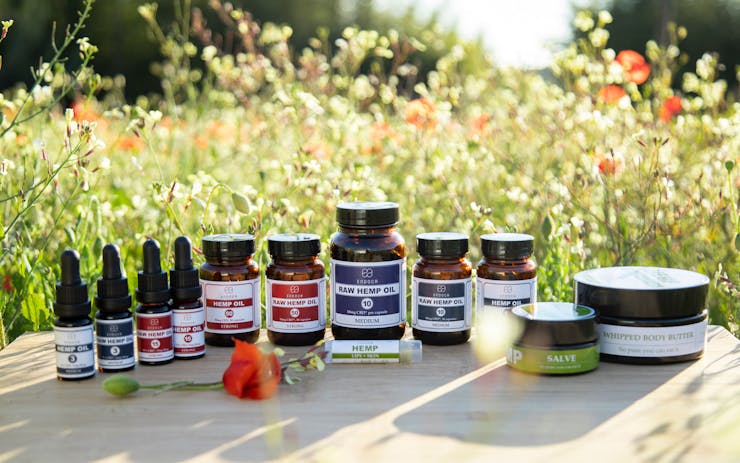This article is presented by Endoca, providing hemp CBD products crafted to the highest possible standards and sourced from sustainably grown hemp.
When a product is labeled “organic,” that can mean a lot of different things. The product might meet the minimum requirements for one country or another, though standards can vary widely across international borders. Depending on the origin and how the label reads, the end result can range from mostly organic to 100% free of chemicals and pesticides—or, depending on the farmer, something even stricter. That means it’s one thing to make sure you’re buying something with “organic” on the label, and another to look deeply into how a cannabis project is made.
For European hemp grower Endoca, its own standards for “organic” go beyond standard label practices. It’s more of a mission: farming in a way that works to build a sustainable future for the planet from the seed through the end manufacturing and packaging process.
“Unfortunately, current organic farming does not actually require growing without chemicals, and legislation the world over allows certain levels of fertilizers and pesticides in organic farming practices,” says Endoca CEO Henry Vincenty. “For us, it isn’t enough to abide by these rules.”

(mustafagull/iStock)
Organic from the Ground Up
Endoca has been breeding hemp for more than 10 years, building a crop with a wide spectrum of beneficial cannabinoids. But each plant starts in soil free of synthetic chemicals and additives.
“Our crops are grown without any chemicals or pesticides using natural, organic fertilizer and nothing else,” Vincenty says.“Our hemp plants do not require much to grow as our climate gets an abundance of water, has amazing soil quality, and receives the sort of light spring and summer that helps ensure a wide variety of plant compounds, as well as seeds for our next crop.”
It’s fitting that as Endoca’s farms expand, the hemp plants they cultivate actually help Endoca clean up the soil for future generations.
“Hemp farming can help transform soil, making it cleaner and healthier. This takes time, at least one full hemp crop cycle and sometimes more depending on the state of the soil,” Vincenty explains. “We believe this lengthy development is worth it to know that bit by bit, hectare by hectare, we are reducing the overall need for pesticides and chemicals by improving the underlying health of the soil.”
While preparing soil for Endoca’s hemp farming takes a lot of time, their team of hemp farmers believe it’s more than a worthwhile investment.
“Many farmers think organic farming is expensive,” Vincenty says. “However, in the long run, we find it cheaper since we don’t rely on costly pesticides and other chemicals.

(ideeone/iStock)
Best Practices in Processing
Endoca doesn’t just look toward the future in the fields. They extract with CBD and other cannabinoids from their hemp harvest using a CO2 extraction setup powered by 100% clean energy. Extractions are performed in a lab that meets strict GMP standards, and the resulting CBD extracts, from CBD oil to isolate crystals, are thoroughly tested for cannabinoid and terpene content.
Keeping control of their CBD and sources from sowing seeds to extracting oils is a key value for the Endoca team. Vincenty believes the result is a better CBD extract that harnesses the power of the entire plant. And since Endoca has been breeding hemp plants for years, their plants aren’t just about CBD, but contain a variety of minor cannabinoids as well.
“We are proudly whole-plant which means all the vital plant molecules that make cannabis so powerful—minus THC—are in our extract,” said Vincenty. “In our opinion, this adds to the therapeutic potential of our plants and our extracts alike.”

(Courtesy of Endoca)
Passing the Test
To ensure they’re serving every customer as effectively as they can, Endoca conducts a variety of testson their CBD oil and extracts, both on their own and in partnership with third party labs.
“It’s one thing to say on your website that you grow without pesticides or chemicals, but it’s another to have a third party focused purely on verifying this aspect,” says Vincenty. “Most companies test for no more than 20 to 30 fertilizers and heavy metals, whereas Endoca tests for over 300.”
It’s not just one batch tested one time, either. Patients can check the batch number on Endoca’s CBD oils and look up the lab results for that specific harvest and extraction, including concentrations of CBD and minor cannabinoids, terpene levels, and the microbial profile.
It’s this careful process that allows Endoca’s products to actually be prescribed by a doctor in countries like Australia and New Zealand.
“With our strict testing standards, organic certification, and registered active pharmaceutical ingredient, we are able to produce pharmaceutical-grade extracts with a reliable safety profile,” said Vincenty.
By paying close attention to both their inputs and outputs, Endoca is aiming to set an example of what CBD products can look like from seed to sale—one that they hope others will take note of.
“In terms of agricultural and pharmaceutical application, we think hemp cannabis is going to be an incredibly important industry in the 21st century,” says Vincenty. “We are proud to be demonstrating what is possible in this growing field.”






